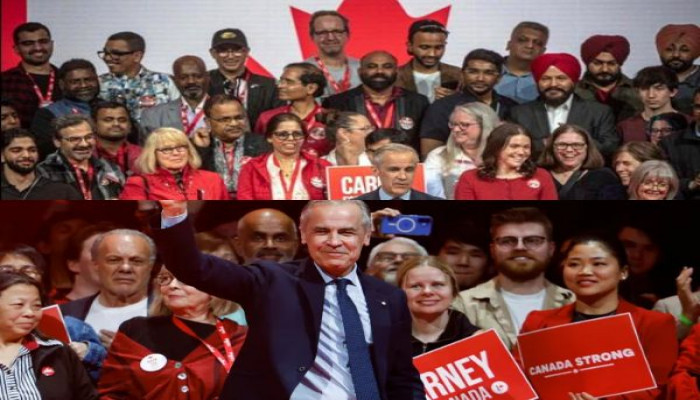22 Punjabis elected to Canadian House of Commons
- In Reports
- 08:34 PM, Apr 29, 2025
- Myind Staff
The federal elections on Tuesday saw 22 members of Punjabi origin entering the House of Commons in Canada, making it a first time in history. Of the total 65 Punjabi contenders, this is the greatest count to be ever elected to the Parliament of Canada. This is more than the previous 20 in 2019 and 18 in 2021.
This electoral milestone runs parallel to the Prime Minister Mark Carney's win in elections, ensuring the Liberal Party's comeback and eventual government formation. The Punjabi community comprises one-fifth of Canada’s South Asians, with most of them in direct contest with each other.
All five Punjabi candidates won in Brampton, a big South Asian-populated city in the township of Brampton. In Brampton North, Ruby Sahota of the Liberal Party won over Amandeep Judge of the Conservative Party. Maninder Sidhu of the Liberal Party defeated Bob Dosanjh of the Conservatives in Brampton East and Amandeep Sohi defeated Taran Chahal for the Liberals to win in Brampton Centre.
The Conservatives also registered major victories. In Brampton South, Sukhdeep Kang was declared winner over Liberal Sonia Sidhu, while Amarjeet Gill beat sitting minister Kamal Khera from Brampton West, both representatives of the Conservative Party.
Some important names among Punjabi-origin Liberals are Anita Anand from Oakville East, Bardish Chagger from Waterloo, Anju Dhillon from Dorval-Lachine, Sukh Dhaliwal from Surrey Newton, Iqwinder Singh Gaheer from Mississauga Malton, Randeep Sarai from Surrey Centre, Gurbax Saini from Fleetwood Port Kells, and Param Bains from Richmond East Steveston.
Punjabi winners among the Conservative Party include Jasraj Hallan-Calgary East, Dalwinder Gill-Calgary McKnight, Amanpreet Gill-Calgary Skyview, Arpan Khanna-Oxford, Tim Uppal-Edmonton Gateway, Parm Gill-Milton East, Sukhman Gill-Abbotsford South Langley, Jagsharan Singh Mahal-Edmonton Southeast, and Harb Gill-Windsor West.
New Democratic Party (NDP) leader Jagmeet Singh faced a major defeat in Burnaby Central, British Columbia. Wade Chang of the Liberal Party and James Yan of the Conservative Party finished ahead of him. He finished third with less than 19% of the vote. This defeat reflects a broader collapse for the NDP. The party now expects to win only seven seats, just one above the break-even point and 18 fewer seats than in 2021. This puts their official party status in the House of Commons at risk. Their national vote share fell by 12 percentage points, down to only 6%.
The Liberal Party made a strong comeback under its new leader and Prime Minister, Mark Carney. Earlier this year, the party seemed headed for a crushing defeat. However, Carney delivered an outstanding performance. However, the Liberal Party narrowly missed a majority but secured enough seats to form a government with support from smaller parties.
Carney’s economic experience won over voters. He led the Bank of Canada during the 2008–09 financial crisis and the Bank of England during the Brexit turmoil. His steady leadership contrasts sharply with Conservative leader Pierre Poilievre. Poilievre’s campaign lost momentum amid U.S. President Donald Trump's statements on Canada.
Trudeau’s resignation boosted the Liberal Party’s chances. On January 6, the day Trudeau announced he would step down, the Conservatives led the Liberals by over 20 points in most polls. Public frustration over high costs and Trudeau’s long tenure fuelled that lead. His departure changed the party’s direction and played an important role in a major turnaround of the election outcome.







Comments